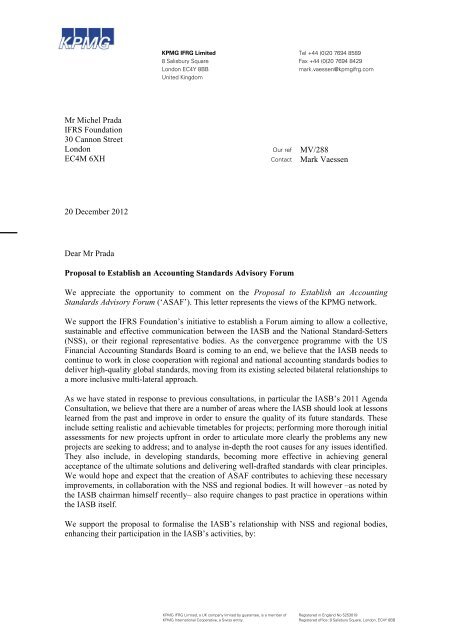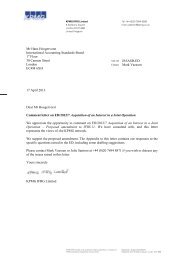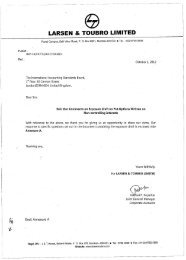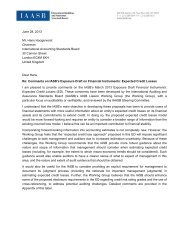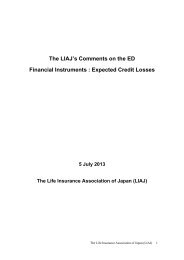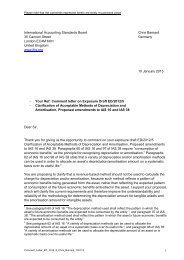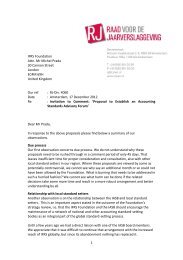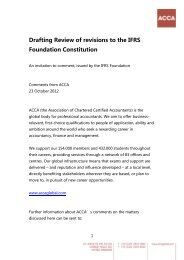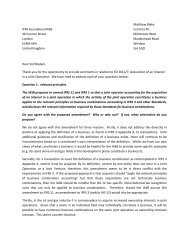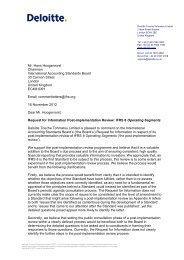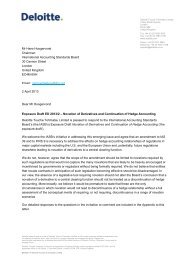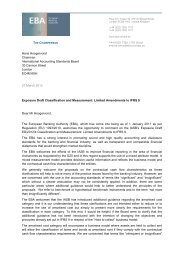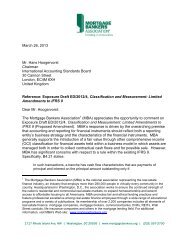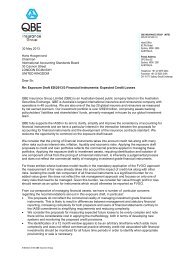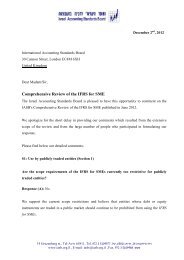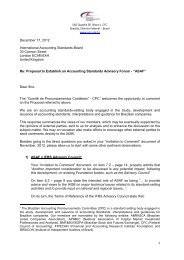KPMG comment letter - eIFRS
KPMG comment letter - eIFRS
KPMG comment letter - eIFRS
Create successful ePaper yourself
Turn your PDF publications into a flip-book with our unique Google optimized e-Paper software.
<strong>KPMG</strong> IFRG Limited Tel +44 (0)20 7694 8589<br />
8 Salisbury Square Fax +44 (0)20 7694 8429<br />
London EC4Y 8BB<br />
mark.vaessen@kpmgifrg.com<br />
United Kingdom<br />
Mr Michel Prada<br />
IFRS Foundation<br />
30 Cannon Street<br />
London<br />
EC4M 6XH<br />
Our ref<br />
Contact<br />
MV/288<br />
Mark Vaessen<br />
20 December 2012<br />
Dear Mr Prada<br />
Proposal to Establish an Accounting Standards Advisory Forum<br />
We appreciate the opportunity to <strong>comment</strong> on the Proposal to Establish an Accounting<br />
Standards Advisory Forum (‘ASAF’). This <strong>letter</strong> represents the views of the <strong>KPMG</strong> network.<br />
We support the IFRS Foundation’s initiative to establish a Forum aiming to allow a collective,<br />
sustainable and effective communication between the IASB and the National Standard-Setters<br />
(NSS), or their regional representative bodies. As the convergence programme with the US<br />
Financial Accounting Standards Board is coming to an end, we believe that the IASB needs to<br />
continue to work in close cooperation with regional and national accounting standards bodies to<br />
deliver high-quality global standards, moving from its existing selected bilateral relationships to<br />
a more inclusive multi-lateral approach.<br />
As we have stated in response to previous consultations, in particular the IASB’s 2011 Agenda<br />
Consultation, we believe that there are a number of areas where the IASB should look at lessons<br />
learned from the past and improve in order to ensure the quality of its future standards. These<br />
include setting realistic and achievable timetables for projects; performing more thorough initial<br />
assessments for new projects upfront in order to articulate more clearly the problems any new<br />
projects are seeking to address; and to analyse in-depth the root causes for any issues identified.<br />
They also include, in developing standards, becoming more effective in achieving general<br />
acceptance of the ultimate solutions and delivering well-drafted standards with clear principles.<br />
We would hope and expect that the creation of ASAF contributes to achieving these necessary<br />
improvements, in collaboration with the NSS and regional bodies. It will however –as noted by<br />
the IASB chairman himself recently– also require changes to past practice in operations within<br />
the IASB itself.<br />
We support the proposal to formalise the IASB’s relationship with NSS and regional bodies,<br />
enhancing their participation in the IASB’s activities, by:<br />
<strong>KPMG</strong> IFRG Limited, a UK company limited by guarantee, is a member of<br />
<strong>KPMG</strong> International Cooperative, a Swiss entity.<br />
Registered in England No 5253019<br />
Registered office: 8 Salisbury Square, London, EC4Y 8BB
ABCD<br />
<strong>KPMG</strong> IFRG Limited<br />
Proposal to Establish an Accounting Standards Advisory Forum<br />
20 December 2012<br />
<br />
<br />
<br />
Obtaining support and commitment in the process of developing high quality global<br />
accounting standards that can count on a broad acceptance once developed, by obtaining<br />
NSS’ collective advice on the technical aspects of the IASB’s standard setting activities on<br />
a regular basis.<br />
Allowing IASB to get access to the best available global thinking on technical issues, to<br />
subject matter expertise, research capacity and resourcing.<br />
Obtaining views on and potential issues with new proposals from all regions in the world<br />
early in the standard setting process.<br />
We believe that the objectives of ASAF should be more clearly articulated than is currently the<br />
case in the proposal. In our view ASAF should focus in particular on the research and<br />
development phase of the standard setting process, rather than on issues pertaining to<br />
consistency of application of existing standards.Furthermore, the objectives of ASAF should be<br />
clearly distinguished from those of the IFRS Advisory Council. The latter’s focus should remain<br />
on advising the IASB and Trustees on strategic matters pertaining to the standard setting process<br />
and its governance. The focus of ASAF instead should, in our view, be firmly on the<br />
development of new standards and on advising the IASB on the various technical and<br />
conceptual issues it needs to resolve in major new projects.<br />
As noted in paragraph 7.2, we agree that the impact of the creation of ASAF on other existing<br />
Foundation bodies, such as the Advisory Council, needs further consideration– for example with<br />
respect to rationalisation of membership.<br />
The relationship between the IASB and the NSS and regional bodies through ASAF should be<br />
conducted in a spirit of cooperation and collaboration. That said, however, the IFRS Foundation<br />
will need to ensure that ASAF de facto is, and will be perceived as, an advisory body only.<br />
Because of its composition and the technical nature of its future debates, there is a risk that<br />
ASAF may become to be seen as a ‘parallel board’ where decisions are being pre-determined.<br />
We believe that it is of crucial importance that this is not the case and that this risk – real or<br />
perceived – is sufficiently mitigated in its set-up. The fact that ASAF is not part of the<br />
institutional structure of the Foundation (paragraph 6.6) but rather an outside advisory body and<br />
that there is an explicit members’ commitment to independence of the IASB are helpful factors<br />
in this respect. Setting clear objectives for ASAF from the outset is, in our view, another key<br />
element. The latter also includes clearly articulating expected outputs from ASAF and how the<br />
IASB plans to deal with the advice it receives.<br />
With respect to the composition and number of seats, we believe that the principle should be<br />
that ASAF is sufficiently inclusive and representative to allow those with a legitimate interest to<br />
have a seat at the table. The number of seats available should be a factor of the overall<br />
objectives of ASAF. We have no strong view on the precise number of seats. The number of<br />
seats should be limited enough to have an effective discussion of issues of a technical nature,<br />
but large enough to allow a representative mix of regional and major national accounting<br />
standards organisations.<br />
Finally, as the IASB has been formalising its relationships with various stakeholders over the<br />
past years, including preparers, investors and now standard setters, we note that at present there<br />
is no formal platform through which the IASB liaises with the accounting profession at large.<br />
We believe that consideration to such a platform should be given, possibly in a combination<br />
with regulators.<br />
MV/288 2
ABCD<br />
<strong>KPMG</strong> IFRG Limited<br />
Proposal to Establish an Accounting Standards Advisory Forum<br />
20 December 2012<br />
We have set out our detailed responses to questions 1 and 2 included in your invitation to<br />
<strong>comment</strong> in the appendix to this <strong>letter</strong>.<br />
Please contact Mark Vaessen +44 (0)20 7694 8589 if you wish to discuss any of the issues<br />
raised in this <strong>letter</strong>.<br />
Yours sincerely<br />
<strong>KPMG</strong> IFRG Limited<br />
MV/288 3
ABCD<br />
<strong>KPMG</strong> IFRG Limited<br />
Proposal to Establish an Accounting Standards Advisory Forum<br />
20 December 2012<br />
Appendix<br />
Question 1<br />
Do you agree with the proposed commitments to be made by ASAF members (paragraph 6.4)<br />
and that they should be formalised in a Memorandum of Understanding (paragraph 6.5)? Why<br />
or why not?<br />
We support the overall direction of the proposed commitments for the ASAF members and<br />
agree that they should be formalised in a Memorandum of Understanding. We believe that a<br />
formal agreement to share commitments to quality, independence and transparency will allow<br />
ASAF both to provide IASB with high quality advice on potential issues and to contribute to the<br />
IASB’s technical work.<br />
We strongly agree that ASAF should be an advisory body only and therefore would not have<br />
any decision-making authority. We would expect, however, the views presented in ASAF to be<br />
carefully considered by the IASB, and for the Board to provide progress reports as to how issues<br />
discussed with ASAF have been ultimately decided.<br />
Question 2<br />
The Foundation believes that, in order to be effective, the ASAF needs to be compact in size, but<br />
large enough to allow for an appropriate global representation. Do you agree with the<br />
proposed size and composition as set out in paragraphs 6.7-6.13? Why or why not?<br />
The number of seats available should be a factor of the overall objectives of ASAF. We agree<br />
that ASAF should be sufficiently small to be productive, yet large enough to allow all major<br />
geographies to feel included and sufficiently represented and support the development of<br />
generally accepted global standards.<br />
In this regard, we support regional bodies to have a seat in ASAF, because of their ability and<br />
responsibility to effectively, timely and efficiently reach out to all the NSS in their respective<br />
regions, including smaller countries, to obtain views and flag any potential issues. Furthermore,<br />
we would expect major NSS, taking into account the factors mentioned in paragraph 6.11, to get<br />
appointed a seat in ASAF. We believe that the ultimate number of seats available should<br />
accommodate such representation.<br />
It is not clear from the proposal who appoints the members of ASAF. We assume that it will be<br />
the IFRS Foundation, based on applications received from each region. Some flexibility should<br />
be considered for each region to determine a balanced representation in terms of skill sets and<br />
geographies. The degree of maturity of capital market, technical expertise, past contributions to<br />
IASB and availability of resources are factors that we believe should be taken into account<br />
when selecting the NSS representatives. We would expect the regional bodies and members of<br />
the monitoring board to be consulted in this process.<br />
We agree that the membership of the ASAF should be reviewed every two to three years, with a<br />
possibility to rotate members periodically. We would expect such review to include an<br />
evaluation members’ performance.<br />
MV/288 4


